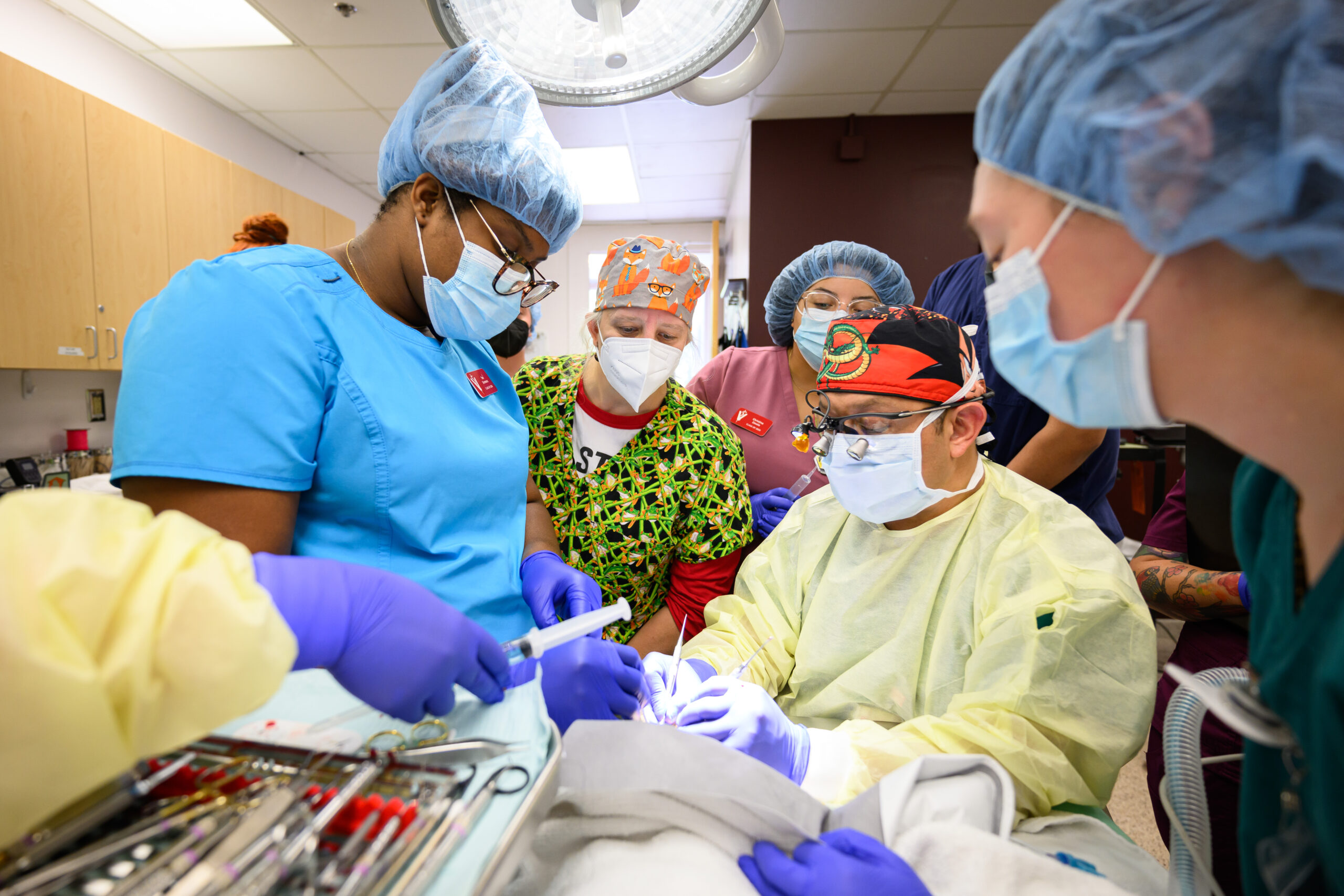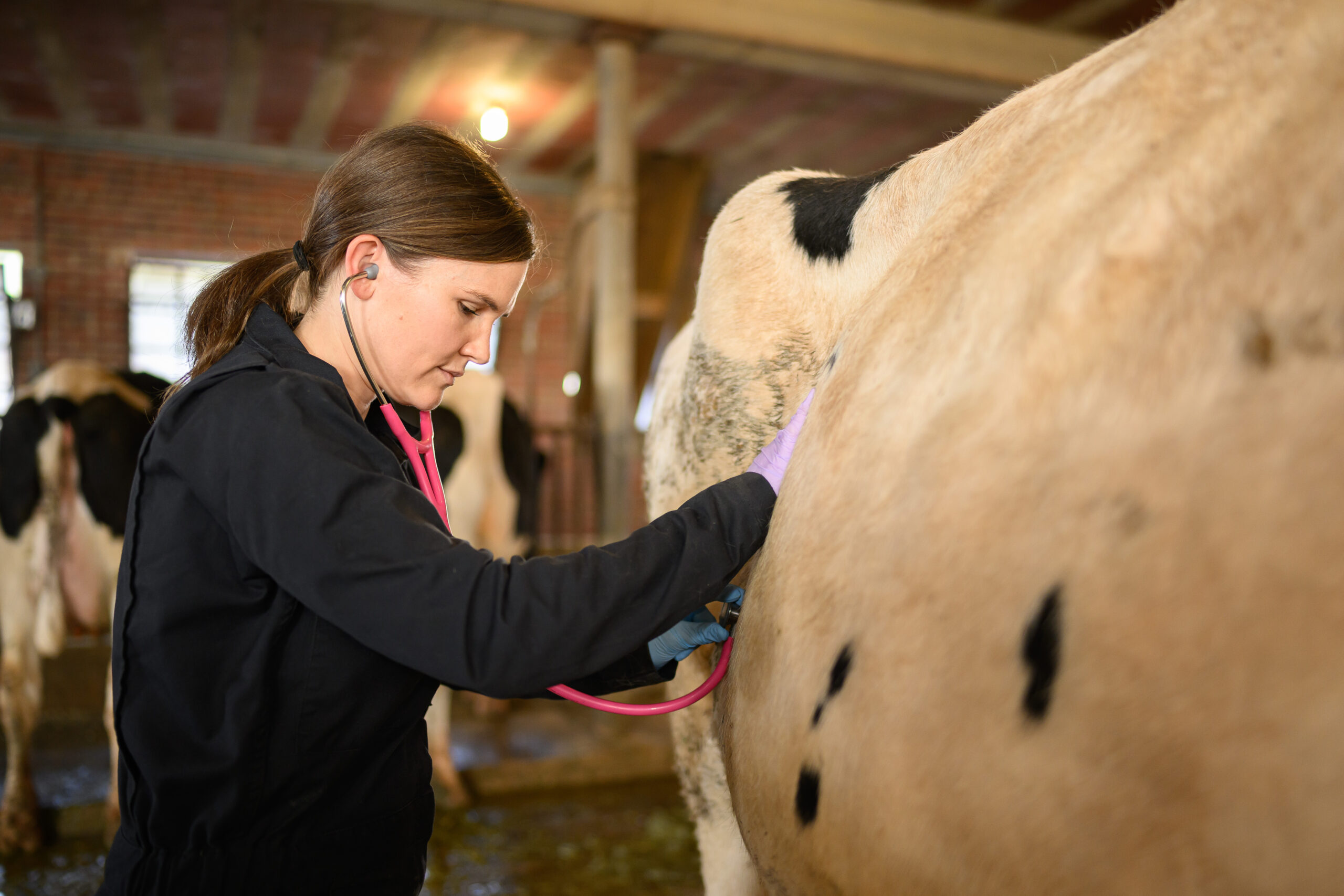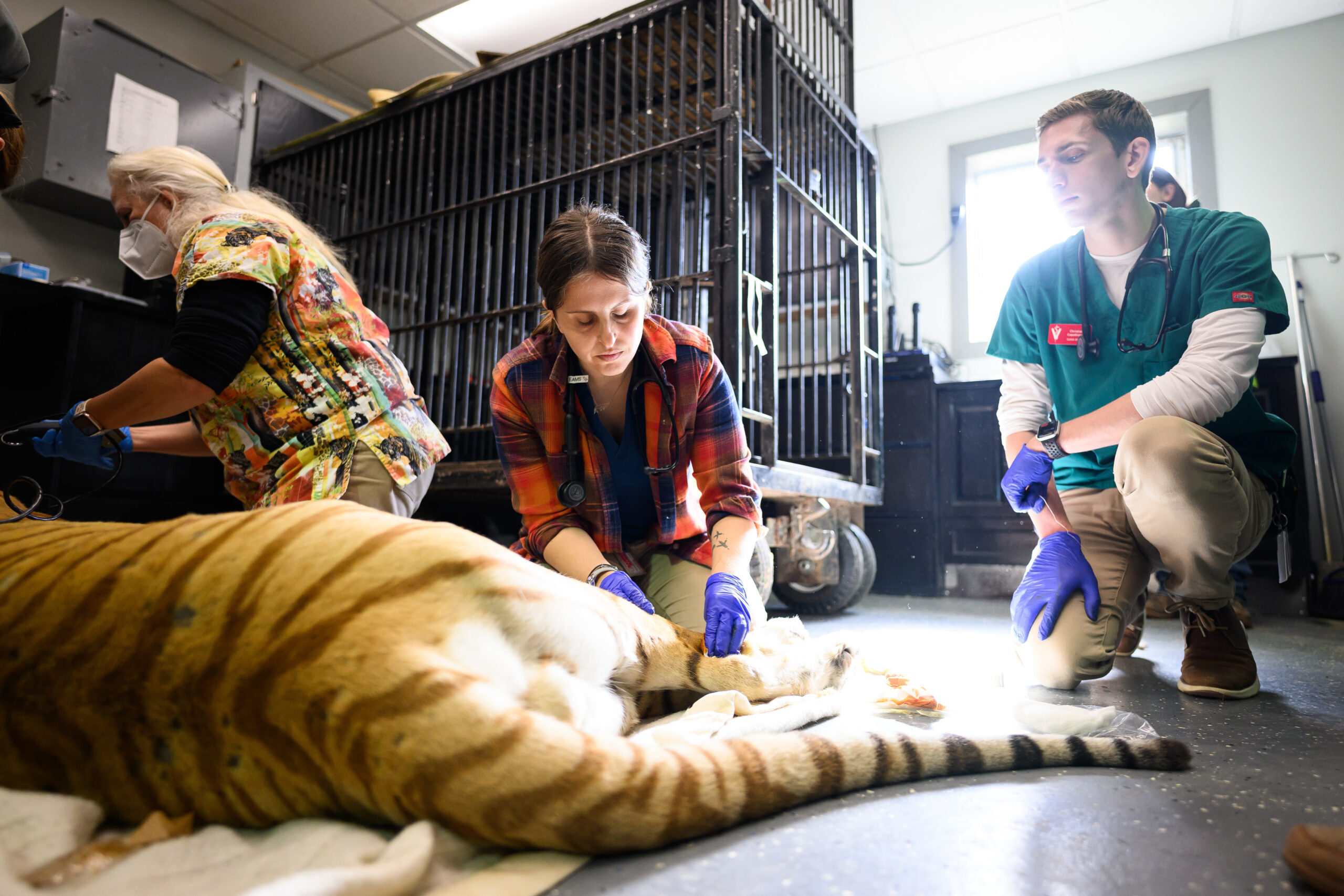Extramural Studies
The extramural studies program provides students with exposure to learning experiences off-campus. Students may identify practices, laboratories, and other study environments that provide experiences that cannot be accessed within the College of Veterinary Medicine. Under the direction of a faculty mentor, the student can design a learning program utilizing the outside resource and receive academic credit.
- Jump to: Information for Students
- Jump to: Information for Supervising Veterinarians
- Jump to: Information for Employers interested in hosting an extern

Information for Students
Course Offerings
Current Extramural Experiences
Rules & Requirements
Students in Years 1 – 3
STUDENTS CAN RECEIVE THE FOLLOWING ACADEMIC CREDITS FOR EXTRAMURAL EXPERIENCES:
- Selective credit (Years 1-3)
- Elective credit (Years 1-3)
REQUIRED DOCUMENTATION:
- Extramural Registration Form
- Supervisor’s Evaluation
- Student Extramural Report
- **If externing in North Carolina, third year students must complete and submit the NCVMB Student Intern Application before Extramural begins
PROCEDURES:
- Complete the Extramural Registration Form a minimum of 30 days prior to the start of your experience.
- The system will email you the Student Extramural Report at the close of your extramural. Submission of your Student Report will send an email to your site supervisor with the evaluation for them to complete. Both the Student Report and the Supervisor Evaluation are due within 30 days of the completion of your extramural.
OVERALL RULES:
- Students are not recommended to visit the same location for extramural credit. Should students seek to attend the same location for credit, they will need to provide a justification to the course coordinator of the extramural to indicate why the additional experience would be significantly different from the first, enough so to justify credit. The coordinator may or may not approve this additional experience; if approved, clear coordinator approval must be attached to the registration form.
- Students may only receive selective credit for an extramural experience in the semester in which the experience occurs and during the selective period. No advance or retroactive credits will be given.
- The student must be at the practice 5 working days and 40 hours (1 week) to qualify for 1 selective credit or 10 working days and 80 hours (2 weeks) to qualify for 2 selective credits.
- Extramural experiences may be scheduled for 1 or 2 weeks (1 or 2 selective credits). Ideally, extramural clinical experiences should be scheduled for 2 consecutive weeks, but may be scheduled for 1 week if the other week is being used to take a 1 week selective course.
- Students cannot be matched to a practice in which a family member (parent, spouse, sibling, etc) is an owner or employee.
- Students cannot complete extramurals at their current place of employment or with a current employer.
- A maximum of 2 students can be at the same practice at any one time.
- If needed, students can seek liability coverage through AVMA PLIT.
- Students going outside the US must contact the Director of the Veterinary International Program (currently Dr. Paula Cray) regarding needed insurance and other items. Visit here for details.
- Students will be graded on a pass/fail basis. The major input into the grade will be the supervising veterinarian/scientist’s grade sheet, but other evaluations may also be used. Failure to complete the course requirements will result in an unsatisfactory grade.
- Students should contact the relevant governing veterinary board to determine what activities are permissible to perform during their extramural based on their professional level.
MINIMUM COURSE REQUIREMENTS FOR EXTRAMURAL NON-CLINICAL EXPERIENCES.
These experiences are individually designed by the student and the course coordinator. These are essentially “special topics” type experiences that happen outside the college.
- Course coordinators design these experiences so that the experience can be verified, the student is evaluated, and the experience is evaluated. A supervising veterinarian/investigator must be identified for each experience.
- One week (5 working days) is the minimum length of time for 1 credit of selective experience. Two weeks (10 working days) is required for senior rotation credit. The maximum length of time for the experience depends on the academic credit that the student is requesting.
- The student must complete a registration form for the coordinator.
- The supervising veterinarian/investigator must evaluate the student and the evaluation must be returned to the Student Development office.
- The student must complete a one page summary of the experience and return the evaluation form to the course coordinator
- Students should contact the relevant governing veterinary board to determine what activities are permissible to perform during their extramural based on their professional level. If you are at a North Carolina location first through third year, you can only legally function as a veterinary assistant (called “employee” below) during your extramural visit and perform duties as outlined below (excerpted from North Carolina Privacy Act 90.187.6c):An employee, other than a veterinary technician, intern, or preceptee, may, under the direct supervision of a veterinarian, perform duties including collection of specimen; testing for intestinal parasites; collecting blood; testing for heartworms and conducting other laboratory tests; taking radiographs; and cleaning and polishing teeth, provided that the employee has had sufficient on-the-job training by a veterinarian to perform these specified duties in a competent manner. It shall be the responsibility of the veterinarian supervising the employee to ascertain that the employee performs these specified duties assigned to the employee in a competent manner. These specified duties shall be performed under the direct supervision of the veterinarian in charge of administering care to the patient.
ELECTIVE RULES
- If an extramural experience occurs over a summer or vacation period, credit is not generally allowed. If it is an international experience approved in advance, credit can be considered. If a student completes an international extramural experience in the summer (with prior approvals, etc), he or she can apply for elective credit but would need to pay summer tuition. If the international experience occurs over fall, winter, or spring break (with prior approvals, etc.), he or she can apply for elective credit for the current semester or the semester immediately following the experience depending on the timing of the experience.
- Elective credits appear on the student’s transcript but are not usually required for graduation. Some focus areas have required electives, but not all focus areas offer elective credit.
- Elective credits are variable and must be agreed upon by the student and course coordinator prior to the extramural experience.
- Overall rules apply including all extramural paperwork, signatures, and deadlines for elective extramural experiences.
EXTENUATING CIRCUMSTANCES
- The student should contact the course coordinator or Associate Dean for Academic Affairs immediately.
- If the experience is a required course (selective or clinical rotation), the Associate Dean of Academic Affairs will work with the course coordinator to schedule a replacement experience.
Students in Year 4
REQUIRED DOCUMENTATION
- Complete the Extramural Registration Form a minimum of 30 days prior to the start of your experience.
- If externing in North Carolina, students must complete and submit the NCVMB Student Intern Application as a part of their Extramural
- The system will email you the Student Extramural Report at the close of your externship. Submission of your Student Report will send an email to your site supervisor with the evaluation for them to complete. Both the Student Report and the Supervisor Evaluation are due within 30 days of the completion of your externship.
While the sign-up/drop deadline is at least one month before the start of the experience, some experiences must be scheduled years ahead of time. The Registration Form must be completed 30 days prior to your externship. Students should plan accordingly and allow time to get the necessary forms completed by your site supervisor. If the completed form is not received by the deadline, the student may be dropped from the externship and required to register for a clinical rotation.
Additional Documentation may be required depending on the location of your externship, including liability insurance, registration with the North Carolina Veterinary Medical Board, and liability protection through the AVMA.
GRADING AND CREDIT
Students will be graded on a Honors/Pass/Marginal/Fail basis. The grade will comprise of a mix of the Supervisor’s Evaluation and the Student Experience Form, but other evaluations may also be used. Failure to complete the course requirements will result in a marginal or failing grade.
Clinical-year students can receive a maximum of 6 credits (3 rotations) for clinical-year externship rotations unless additional externships are specifically required for their focus area.
- Focus Areas with a maximum of 6 externship credits (3 rotations): Equine; Laboratory Animal Medicine; Mixed Animal Practice; Pathology; Small Animal; Small Animal-Avian/Exotics; Zoological Medicine.
- Focus Areas requiring additional externships: Clinician Scientist; Epidemiology & Public Health; Food Animal.
TIME REQUIREMENTS
NC State Clinical-Year Students: all Clinical extramural experiences must be taken for a minimum of 10 full working days.
- Both 2-week and 3-week rotations require NCSU students to complete a minimum of 10 full working days, with the understanding that students will work both the full amount of days (10 days) and the full amount of hours (80 hours).
- For 3-week extramurals: while the minimum requirement is 10 full working days, the understanding is that students will work every available workday of the 3 weeks (excluding holidays). Students should not plan to work the minimum 10-day requirement and then plan a week’s vacation. The 10-day minimum was put in place to account for rotations that included holidays and holiday weekends – students are expected to spend all other available workdays at the externship location.
Contract Students: because Contract Schools measure clinical year credits by weeks, the number of weeks at an externship determines the amount of credit received for the experience.
- Externships in a 2-week block require 10 full workdays for 2 credits.
- Externships in a 3-week block require 15 full workdays for 3 credits. If a student chooses to spend only 10 days at an externship in a 3-week block, he will receive 2 credits for the experience – the 3rd week will be counted as a vacation week.
- Externships may be taken in Block 1 for 3 weeks of credit if the student fulfills the 3-week requirement of completing 15 full workdays at the externship location. Because Block 1 starts mid-week each year, the student will need to spend weekend hours at the location to fulfill requirements.
- If the student completes 10 full workdays at a location during Block 1, they will receive 2 weeks of credit for the experience, and the 3rd week will be considered a vacation week.
RESTRICTIONS & EXTENUATING CIRCUMSTANCES
Externship Restrictions
- Students are not recommended to visit the same location for externship credit. Should students seek to attend the same location for credit, they will need to provide a justification to the course coordinator of the externship to indicate why the additional experience would be significantly different from the first, enough so to justify credit. The coordinator may or may not approve this additional experience; if approved, clear coordinator approval must be attached to the registration form.
- If a student is scheduled for an externship experience but fails to formally approve the experience by submitting the required Registration Form within the stated deadlines, the student will be dropped from the block and required to schedule another rotation in its place.
- If a student completes an externship experience but fails to submit the required paperwork within the stated deadlines, a failing may be recorded.
- Students cannot be matched to a practice in which a family member (parent, spouse, sibling, etc.) is an owner or employee.
- Students cannot complete externships at their current place of employment or with a current employer.
- A maximum of two students can be at the same practice at any one time.
- Students should be at the same location for the entire duration of the experience. Splitting time at 2 or more locations is not permitted.
- Students should contact the relevant governing veterinary board to determine what activities are permissible to perform during their externship based on their professional level.
Extenuating Circumstances
- If a student has to leave an externship experience because of extraordinary circumstances (sickness, safety concerns, ethical concerns, etc.), the student should contact the Course Coordinator or Associate Dean of Academic Affairs immediately.
- If the experience is a required course (selective or clinical rotation), the Associate Dean of Academic Affairs will work with the Course Coordinator to schedule a replacement experience.
Externship Search Options
If you want to set up an externship experience but aren’t sure what options are out there, the search engines/lists below can help you narrow down some potential locations.
- NC State Extramural Search Engine
- **Must have an active NCSU Unity ID to access
- AVMA Externship Locator
- Pathology Experiences
- ePACK
Helpful Links

Information for Supervising Veterinarians
Thank you for hosting an NC State veterinary student for their extramural experience. We appreciate your time and mentorship! These important experiences help to build veterinary students’ knowledge and expose them to different areas of the veterinary field that may spark or further develop their interests, and we appreciate your support as we develop future veterinarians.
Please contact CVM-Extramural@ncsu.edu (919-513-6210) if you have questions or concerns.
Expectations for Supervising Veterinarians
NC State CVM students have opportunities to pursue extramural experiences in each year of their program, so they may be coming to you with varying levels of experience.
Student Participation
- Years 1-2 Veterinary Students
- In North Carolina, the NC Veterinary Medical Board (NCVMB) restricts first and second year veterinary students to the functions of a veterinary assistant, as outlined by the NC Veterinary Practice Act (90-181.9; 90-197.6). In another state, please consult your veterinary board if clarification is needed.
- Years 3-4 Veterinary Students
- In North Carolina, the NC Veterinary Medical Board (NCVMB) allows students who have successfully completed the second year of veterinary school to act as veterinary student interns, as outlined by the NC Veterinary Practice Act (90-181.9; 90-197.6). In another state, please consult your veterinary board if clarification is needed.
- As veterinary student interns, third and fourth year veterinary students are permitted to perform the same duties as veterinary technicians. From the NC Veterinary Practice Act: “Veterinary student interns, in addition to all of the services permitted to veterinary technicians, may, under the direct personal supervision of a veterinarian, perform surgery and administer therapeutic or prophylactic drugs” (90-187.6-d).
We Ask that Our Extramural Partners:
- Provide students with an orientation of the practice/facility, covering specifics regarding the student’s roles, responsibilities, and how they will be evaluated.
- Request/require/allow students to participate only in activities for which they are qualified and can legally perform (please see the section above for clarification on what Years 1-2 students and Years 3-4 students are allowed to participate in).
- Provide opportunities for student participation in clinical decision-making.
- Guide student development in clinical reasoning, diagnosis, and patient management.
- Assess student’s performance in the areas of attitude and effort, interpersonal and communication skills, organizational ability, knowledge base, clinical skills (if applicable), and other expectations (if applicable).
- Support students in developing and further refining their critical thinking abilities.
- Comply with the terms of any relevant Agreement between NC State and the Extramural Site. For more information on whether an Agreement has been entered into, please contact the appropriate official at the Extramural Site.
- Review and adhere to all other guidelines as set forth by NC State CVM.
- Abide by SAVMA Duty Hours Guidelines. Key points from these guidelines include:
- For every six consecutive hours of work, a break of minimum thirty minutes for meals should be provided.
- Duty hours should be limited to eighty (80) hours a week, averaged over the course of the length of the rotation, inclusive of all on-call activities.
- Students should have two (2) days “off” in a fourteen (14) day rotation.
- Continuous on-site duty, including on-call shifts, should not be scheduled to exceed twenty-four (24) consecutive hours.
- No new patients may be accepted after twenty-four (24) hours of continuous duty.
- On-call shifts should occur no more frequently than one (1) shift in three (3) days, averaged over the course of the length of the rotation (with exceptions of rotations taken explicitly for “emergency” experience).

For Employers Interested in Hosting an Extern:
Please post your listing on ePACK, our internal student recruitment board. This service is free and is an internal NC State job board. All postings here must adhere to NC State’s job posting policy. This provides students with a centralized location to find internships, externships and employment opportunities. However, the College of Veterinary Medicine does not maintain an approved list of externship/extramural locations as you may find at other institutions.
You will need to select the “Employer” option and create a profile for your practice. Once the profile has been completed (usually takes about 5-10 minutes), you can proceed to create your job posting. Postings can remain available for up to 60 days at a time. Once your profile and posting is complete, it will be made available once it has been approved. Approvals generally take up to 72 hours.
You can also view the requirements regarding externships for our students in the sections above.